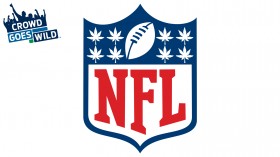 The NFL has finally shown the first flecks of common sense regarding marijuana use among its players. By no means is it time for players to start sparking J’s with reckless abandon, but there is reason to be hopeful that the NFL isn’t as closed-minded as the DEA.
The NFL has finally shown the first flecks of common sense regarding marijuana use among its players. By no means is it time for players to start sparking J’s with reckless abandon, but there is reason to be hopeful that the NFL isn’t as closed-minded as the DEA.
Currently, eleven out of the 32 teams in the NFL have their homes in states that have at least legalized medical marijuana. Pending passage in congress, that number could soon climb to 17 (that’s slightly over 50% of all teams).
NFL Comissioner, Roger Goodell stated that, “if medical experts ever say medical marijuana would help with concussions then [he] would consider allowing it…I don’t know what’s going to develop as far as the next opportunity for medicine to evolve and to help either deal with pain or help deal with injuries, but we will continue to support the evolution of medicine.”
The SI article is very well researched and goes into great depth, I encourage any NFL and/or cannabis fan to check it out. What I found particularly interesting is the unofficial reality among players and managers that cannabis is still commonly (and frequently) used among active players. If a player has no previous recorded history with substance abuse, they are only tested for drugs once a year. Anyone who has ever had to pass a UA on the fly for an employment screening or something knows that, with some planning and discipline, it is not terribly hard to get by the piss test.
A former NFL general manager (spoke anonymously) in agreement of the NFL re-calibrating it’s view on marijuana, “a lot of NFL players play and function at a high level while regularly using pot, that’s the reality of it. They smoked pot in high school and college, just like many of their teammates and classmates.”
Erstwhile linebacker Steve DeOssie, who recovered from alcohol/drug issues while still playing, stated that “marijuana did not help my career,” but, “if marijuana became legal, the reference point for the NFL would be alcohol. Personal responsibility by players would be key. Players would be responsible to not let it derail their careers.”
I have mentioned something similar on responsibility in a former article. An agent interviewed for this story echoes my thoughts, “Some players who smoke too much pot, fall asleep in meetings and they’re not as able to grasp comprehensive schemes. I get that. Well, just replace them. Treat them like players who aren’t fast enough or skilled enough or responsible enough: Cut them and move on. The market takes care of itself.”
A note on cannabis and concussions:
This all still exists in the realm of theory, but there is work being done in Jerusalem that shows that brain trauma (concussions) are significantly reduced in mice when exposed to THC. It is likely a few years before human trials and all the other due diligence can be done for this idea to gain traction, but it is promising.
While I am hopeful that change is on its way, I think we should temper our hopes with some hard realities. Current attorney and former linebacker Shawn Stuckey says, “there is no good reason why the rule shouldn’t be changed. Smoking or ingesting marijuana would be tantamount to taking Benadryl or a sleeping pill before a game. As a player, I could have only dreamed of the opposing offensive lineman or running back getting high the day of a game. It won’t matter what the research shows, things won’t change until public perception — that is, those who financially support the league — changes because there’s too much money at stake.”
DeOssie, our other retired linebacker, agrees: “the NFL tends to be slow to react to changes. The league won’t address marijuana until it absolutely has to. This will be a long process for the NFL.”
Still though, it’s a drop in the bucket and that is infinitely better than a continued drought.









